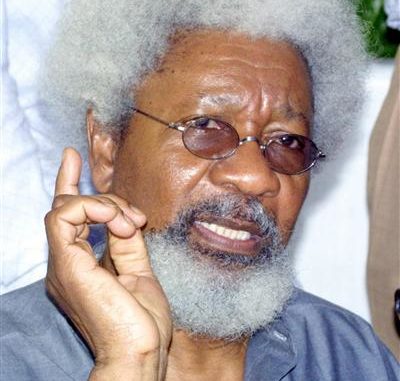
Africa’s first Nobel laureate for literature, Wole Soyinka, said Nigerians must show a Nelson Mandela-like ability to forgive Muhammadu Buhari’s past as an iron-fisted military ruler.
“I criticized him for certain acts during his stint as a military dictator,” Soyinka, the 80-year-old playwright and poet, said in an interview with Bloomberg TV Africa on Wednesday at his hillside home in the southwestern Nigerian town of Abeokuta. “But I also insist that it’s about time we try our best to be mini-Mandelas, to learn there’s a moment when we must put the past aside.”
Buhari’s 20-month term as the military head of state of Africa’s biggest oil producer when he overthrew an elected government in 1983 included a campaign against “indiscipline,” in which the press was muzzled, hundreds of politicians, businessmen and journalists were jailed and police officers ordered to hit people who didn’t line up to wait for the bus.
By voting in Buhari, a 72-year-old northern Muslim who describes himself as a “converted democrat,” many Nigerians have shown an ability to look past his earlier misdeeds, said Soyinka. Buhari denies having ever perpetuated human rights abuses.
“Mandela had a faith in the capacity of the Boer, the masters of apartheid, to reform,” Soyinka said in his booming voice in a living room filled with wooden carvings. “There’s a moment when we must put the past aside, most especially when what presumes to the present becomes intolerable and continues and threatens to prolong itself, then we have to be more pragmatic.”
Monopoly Broken
Buhari, a three-time loser in presidential races, beat President Goodluck Jonathan, 57, the candidate of the People’s Democratic Party in elections held last weekend in Africa’s most populous nation, breaking the PDP’s 16-year monopoly on power. His victory comes against the backdrop of a six-year Islamist insurgency that the government says has killed more than 13,000 people and a collapse of crude prices that has hammered the economy.
Buhari won under the banner of the All Progressives Congress, an alliance of the main opposition parties that formed two years ago and drew support across religious and ethnic divides. That coalition helped Buhari, who is wildly popular in the north, make inroads in parts of the country that haven’t supported him in the past, particularly the southwest, home to the Yoruba people.
“I think more in terms of the APC winning the election,” said Soyinka, who is close to some of its members. Soyinka said reports from APC members and his own observations suggest Buhari was “struggling to be a party man.”
‘Corrupt Figures’
Buhari’s win paved the way for the first democratic transition of power in Nigeria from one party to another. Many members of the ruling party defected to the
, leading to claims that the opposition wasn’t substantially different from its rivals.
“Neither party is filled with angels, there are corrupt figures on both sides,” Soyinka said, claiming this election to have been the most money-fueled in the country’s history. “Some of them I don’t even want to see anywhere near this building. Others, on the other hand, have sat here, these very chairs, eaten and drunk with me.”
The PDP’s 16-year reign, which will end on May 29, has been plagued with corruption scandals in a nation that ranked 136 of 175 countries in Transparency International’s 2014 Corruption Perceptions Index, on par with Russia and Iran.
Festering Disease
Its latest administration also lost popularity due to its inability to tackle the Boko Haram Islamist insurgency in the north of the country. Nigeria delayed elections in February as the military announced a six-week offensive that month. With the support of neighboring countries, it recovered territory lost to Boko Haram.
“Nigerians have a right to be resentful of the fact that that kind of measure was not taken early enough,” Soyinka said. “That this disease was allowed to fester leading to the traumatization of swathes of Nigerian landscape and society and humanity.”
Jonathan, who conceded on Tuesday evening, an unprecedented step in a country accustomed to post-election violence and turmoil, could have attempted to cling to power, said Soyinka. The fact he didn’t makes amends for some of his lapses in government, he said.
“He could have easily tried to do a Gbagbo,” said Soyinka, referring to Laurent Gbagbo, who sparked post-election violence in Ivory Coast when he refused to step down after an election defeat in 2010.
‘Gingers Me Up’
With Buhari’s win, Soyinka, who hasn’t felt this optimistic since the end of military rule in 1999, hopes he won’t be disappointed again.
“Against my rational instincts, I believe that we have here a genuine case of a born-again democrat,” he said. Ultimately, “the real heroes of this exercise have been the Nigerian people and that gingers me up.”
There’s a moment when we must put the past aside, most especially when what presumes to the present becomes untolerable and continues and threatens to prolong itself, then we have to be more pragmatic.” Reports Yinka Ibukun for BloombergTV